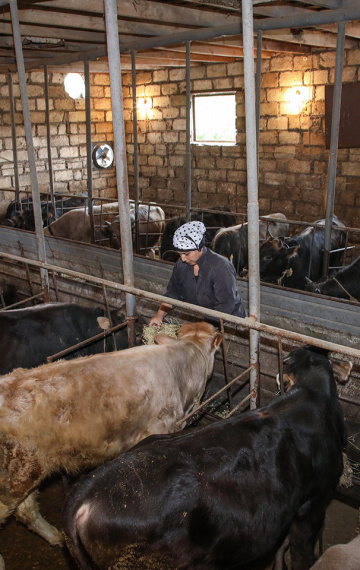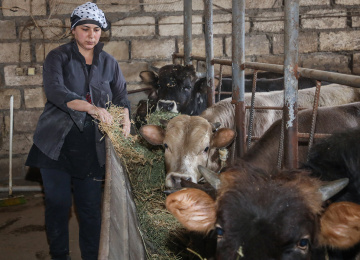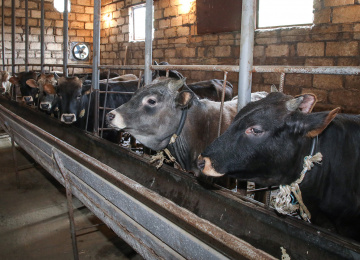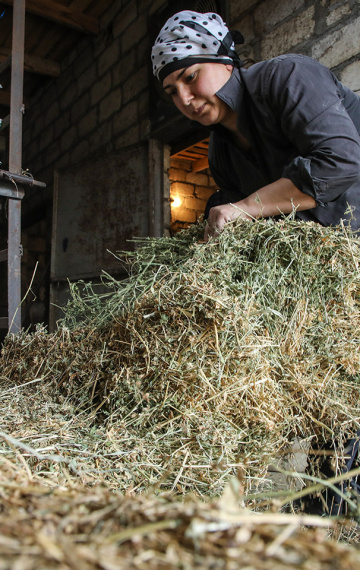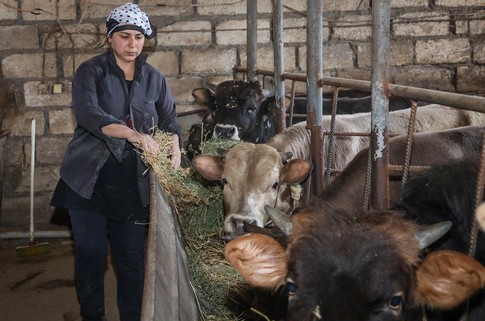
Agriculture is a standard occupation for those who live in rural areas or own farmland. Many people choose animal husbandry because it’s a fairly profitable business. After all, homegrown food is always in demand and this business offers a stable income. But not everything is so simple. Like any business, farmers face a number of challenges. Fargana Garayeva, who lives in the Barda region of Azerbaijan, talks about how she coped and how a EU-funded project helped her increase her income to €13,000 a year.
The challenges of cattle breeding
Livestock farms are developed in many regions of Azerbaijan and Barda is no exception. When it comes to animal husbandry in this country, however, farmers mostly prefer cattle. Fargana Garayeva is one of those owners of farms. She lives in the village of Turkmen and has been breeding cattle since 2013. She has only cows on her farm, which she raises for sale.
Before starting this business, Fargana made sure that the facilities where the animals would live were in line with their needs. Her herd has daily access to fresh air and daylight. In addition to individual stalls, the cattle also have a paddock.
For several years, Fargana has continued to maintain a farm, which at first brought her a bare-minimum of income. The farmer understood that animal husbandry is a commercial activity that requires serious investments, but not only to buy livestock and equipment. Animal feed is a costly, ongoing expense. And so she kept working hard and continued to improve the business.
Moving ahead
In 2019, Fargana Garayeva found out that she could receive additional funding from the Bank Respublika, an intermediary providing loans under the Azerbaijan Agricultural Finance Facility (AZAFF) programme, being carried out by the European Bank for Reconstruction and Development (EBRD) under the EU4Business Initiative. She immediately decided to take advantage of this opportunity and applied for a loan to help expand her business. She received a loan of 15,000 manats or €8,000. At that point, she had only 5 cows on her farm.
“It wasn't enough to grow my business,” notes Fargana Garayeva. “After receiving the loan, I was able to buy more cattle and now I have 20.”
In short, her herd nearly quadrupled. Now the farmer’s business is starting to really boom.
So far, Fargana has been doing almost everything on the farm by herself. Unlike many farms with cows, hers is not a dairy farm and her cows do not produce milk and dairy products. Her main goal is to raise the cows to a certain size and then sell them. This is where Fargana’s husband comes to her aid. He’s always on the lookout for potential buyers.
Today, annual income from Garayeva’s land and the farm has grown to 24,000 manats or €13,000. In the future, she plans to expand her herd and improve conditions at the farm itself.
The Azerbaijan Agricultural Finance Facility is funded by the European Union as part of its EU4Business Initiative. The program is carried out by the EBRD. The programme’s technical assistance budget is around €2 million and it is designed to provide technical assistance services for partner financial institutions and farmers.

